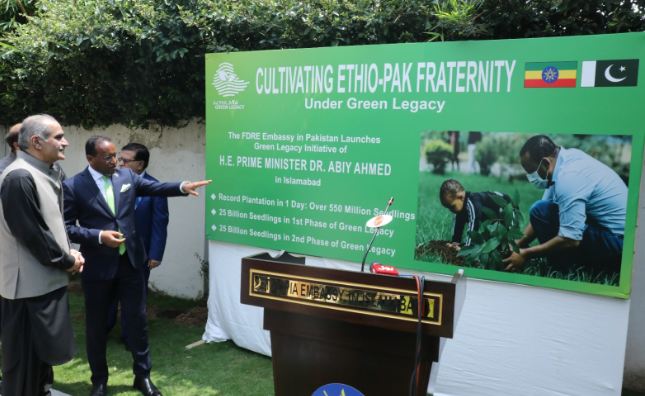By: Ambassador Dr. Jemal Beker Abdula
The contemporary climate change and environmental degradation debates cannot be divorced from Ethiopia’s recently launched Green Legacy Initiative (GLI). It is a landmark development in the country’s history and its historical environment-protecting mission, spearheaded by the current Prime Minister of the Federal Democratic Republic of Ethiopia, Dr. Abiy Ahmed.
The primary mission of GLI, introduced by Prime Minister Ahmed in 2019, is to plant seedlings through a broader social campaign that would let its government ensure social prosperity, economic development, environmental and biodiversity restoration. The seedling planting campaign focuses on the urban and rural areas simultaneously by introducing multifaceted green initiatives with appropriate research and development support. This countrywide green campaign concentrates on the country’s social and ecological goals, strongly connected with the greater theme of a greener, sustainable and cleaner Ethiopia.
While realizing the severe threats of increasing droughts in the country and their impacts on the lives of more than 120 million people, Prime Minister Ahmed tried to raise public awareness about the overwhelming wave of prevailing non-traditional security threats in the Ethiopian nation where the government has marked the environment degradation as a serious challenge. Prime Minister Abiy Ahmed has led the entire nation to understand the significance of green socialattitude and behaviorto support and promote the social practices of planting and protecting trees. It positively contributes to Addis Ababa’s greater mission of encouraging sustainable environmental and social practices in the country to overcome the emerging security threats of the non-traditional nature.
The GLI represents the Ethiopian government’s determination to uphold the notion of creating an environment-friendly and environment-protecting green culture, enabling its government to mitigate the emerging challenges of climate change and global warming. Addis Ababa-based government officials under the leadership of Abiy Ahmed determined to plant billions of trees across the country to reduce the existing levels of carbon dioxide in the air, parallel to decreasing the environment-degrading effects of greenhouse gasses and developed Long Term Low Carbon Emission Strategy by 2030 net zero carbon emission.
The extensive public support for the Prime Minister’s green vision is linked with improving present levels of soil health and water conservation and regulating the country’s vulnerability to extreme weather conditions through enhancing the environment-resilient social capacities of the nation. The motto “A Nation that Plants; A Generation that Sustain” fundamentally mobilized around 39 million general public to join the government’s mission due to Prime Minister’s announcement of calling 2024 as the year of Green Legacy Initiative that break its previously held world record planted 615.7 million within a day.
Thus, Addis Ababa’s green mission has made Ethiopia a popular environment-friendly nation in the world, according to various credible reports. The United Nations Department of Economic and Social Affairs has formally recognized the environment-protecting struggle of Addis Ababa by recalling the country’s history ofbecoming an active part of the United Nations Framework Convention on Climate Change (UNFCC) IN 1994. Several other intergovernmental frameworks of the international community, such as the African Union and World Bank, have appreciated the country’s climate-safeguarding quest. The Guinness World Records list has also registered the Ethiopian tree-planting records and made Ethiopia as one of the leadings nations in international reforestation struggles.
The recent records of planting seedlings showed the government’s high commitment to achieving the defined Tree Planting Targets, which are mentioned in detail on the official online sources of GLI. The GLI’s implementation through massive public participation so far has planted 40.5 Billion seedlings in between 2019 to 2024 of which 56 percent is fruits and 44 percent are various trees suitable to local ecology based on research undertakings. These figures show the persistent efforts of state-society collaboration, which facilitated the current Ethiopian government to achieve its desired climate-specific national targets within a defined timeframe.
Public support has been considered internationally as the factor enabling Dr. Abiy Ahmed’s government to achieve high targets for the plantation. In other words, public support is the outcome of Addis Ababa’s comprehensive history of advocating global environmental efforts, which could be measured on certain lines like the launching of the National Adaptation Plan of Action in 2007, the Program of Adaptation on Climate Change and Nationally Appropriate Mitigation Action in 2010 and endorsing the Climate Resilient Green Economy (CRGE) in 2011. Ethiopia is the first country that adopted a policy to ban fossil car import and incentives the green transition.It is pertinent to mention the positive impact of the country’s evolving green culture on the Ethiopian national economy, which has produced around one million jobs and 130,000 nurseries across the country.
On similar note, Ethiopia has achieved food self-sufficiency and ensured food security and start to export avocado, papaya mango, banana etc to Europe, Middle East and Asia. In light of this perspective, the Food and Agricultural Organization (FAO) of United Nations awarded the prestigious medal Agricola to H.E. Dr. Abiy Ahmed for his role and leadership in ensuring food self-sufficiency, poverty alleviation, sustainable development. This progress validates Addis Ababa’s strengths for meeting global pledges agreed upon at various international forums, such as the Paris Climate Change Agreement, the Sustainable Development Agenda of 2030, and the African Regional Agenda of 2063.
In this way, the Ethiopian campaign of planting massive trees contributes positively to countering the emerging wave of environment-centric global security problems. The global voices for combating the threats of climate change have formally appreciated and acknowledged the Ethiopian role in promoting environmental protection and social practices in the African region. While considering the appreciable efforts of Addis Ababa to restore the degraded landscapes, the Ethiopian government identified the areas needing reforesting under an enhanced natural environment.
So, the multidimensional benefits of Ethiopia’s GLI campaign inflicted a sense of supporting ecosystems and ecological diversity in the African region, and it has become a symbol of a green nation in the region by introducing diverse agroforestry social practices. Moreover, these Ethiopian practices have become exemplary models in the region for other governments whilehelping other nations to follow the state-led broader environment plans of Addis Ababa under Fraternity Planting Programme across Africa. The multileveled phases of planting massive seedlings in different cities and villages proved that the African nations could effectively address the alarming levels of deforestation and soil erosion through the government’s properly structured social awareness campaigns.
Therefore, it could be treated as a blueprint for different African nations witnessing analogous issues of land degradation, agricultural administration, and effective greenland management. The Ethiopian reforestation efforts also led other African nations to start positively engaging different segments of their societies in various productive activities, which could ultimately produce the chance of enhanced community engagement and social mobilization under various political administrations.
The participation of millions of residents in the large-scale tree-planting activities allowed people of different age groups and diverse ethnic backgrounds to show Ethiopian exertions for developing a sense of responsibility and collectiveness in society. In this way, it delivered a message of togetherness to other nations concerning the collective role of the public in supporting the major government policies and developmental initiatives, and the other African nations could find it an interesting case for strengthening the cooperative state-society connections under their respective political systems.
On similar note, the Ethiopian Embassy in Islamabad in collaboration with the Ministry of Climate Change and Environmental Coordination of the Government of Pakistan introduced Ethio-Pakistan Fraternity Planting under Green Legacy Initiative programme throughout the major cities of Pakistan to counter the unfolding the climate danger.












